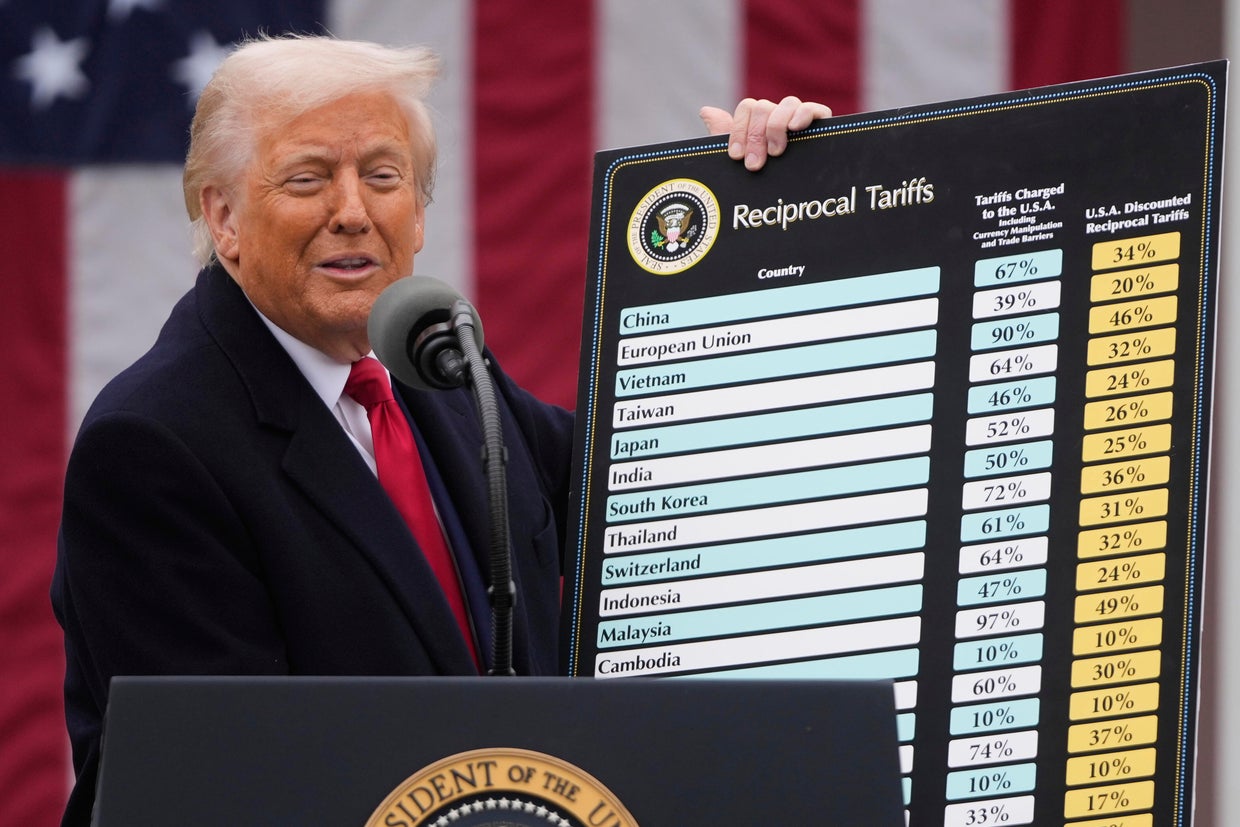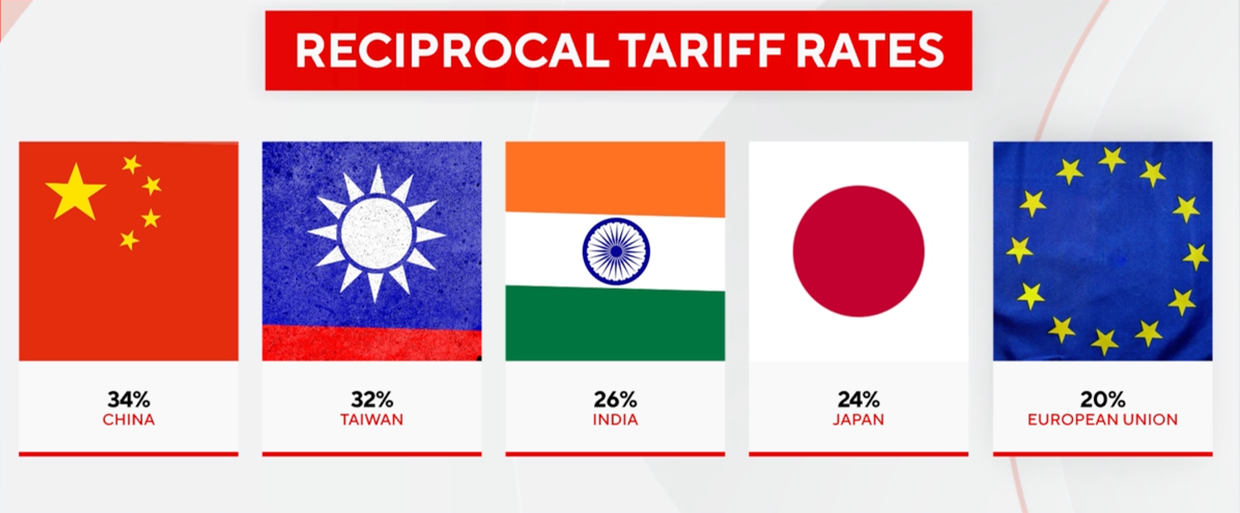President Trump announces 10% baseline tariffs, with more for "worst offenders"
President Donald Trump will announce new tariffs on Wednesday, potentially increasing consumer prices amid concerns from economists and promises to revive American manufacturing jobs.Wednesday, April 2nd 2025, 4:29 pm
WASHINGTON -
Mr. Trump opened his remarks declaring, "This is Liberation Day."
He said April 2, 2025, "will forever be remembered as the day American industry was reborn, the day America's destiny was reclaimed and the day that we began to make America wealthy again."
Mr. Trump exuded confidence about dialing up tariffs despite warnings from economists that they will increase prices on American consumers who have already been hit hard by inflation.
----
President Trump announced new tariffs on Wednesday, which he dubbed "Liberation Day."
Mr. Trump announced a 10% baseline tariff for all U.S. trading partners, to go into effect on April 5. He also announced more reciprocal tariffs against the "worst offenders," which will go into effect on April 9.
Tariffs have been a cornerstone of Mr. Trump's economic policy and have already been imposed on major trade partners including Canada and Mexico.
Tariff critics say new Trump levies will raise prices
Free trade advocates blasted the Trump administration after it unveiled a 10% tariff on all U.S. imports from foreign countries and reciprocal tariffs on more than 60 countries.
Trade experts Colin Grabow and Scott Lincicome of the Cato Institute, a libertarian think tank, said in a statement that the White House's barrage of new tariffs will raise prices for U.S. consumers, dent business investment, dampen broader economic growth and expose American manufacturers to retaliatory trade measures from other countries.
"The tariffs' only clear beneficiaries, meanwhile, will be corporate cronies, K Street influence peddlers and American adversaries who profit from the United States' tarnished international reputation," Grabow and Lincicome said.
The Cato analysts' warning aligns with the view of most mainstream economists, who emphasize that tariffs are paid by U.S. importers and that businesses typically pass along many of those costs to consumers.
Trump signs executive orders
After a nearly hourlong speech, Mr. Trump signed two executive orders enacting the reciprocal tariffs and another closing a U.S. loophole that allows duty-free shipments of Chinese goods worth less than $800.
What is a "reciprocal" tariff?
President Trump on Wednesday announced so-called reciprocal tariffs on roughly 60 countries, along with a baseline 10% universal levy on all U.S. trading partners.
A reciprocal tariff is a tax on U.S. imports that matches the duties that other countries charge on American exports.
In this case, the Trump administration said it will impose reciprocal tariffs at roughly half the rate of duties charged by other nations, a move economists said suggest a willingness by Trump officials to thrash out new trade terms.
A key question moving forward is how long the White House intends to leave the reciprocal and new baseline tariff in place.
"[T]he point to emphasize is that if the purpose of the reciprocal tariffs is to bring countries to the negotiating table, then these tariffs could plausibly have a relatively short lifespan — compared to product-specific or any other blanket tariffs — in cases where trade partners are willing to negotiate," Simon MacAdam, deputy chief global economist with Capital Economics, said in a recent note to investors.
Minimum baseline tariff of 10% to be established, Trump says
The president announced a baseline tariff of 10% on all countries. Mr. Trump said the tariffs would help "rebuild our economy and to prevent cheating."
The baseline tariffs take effect on April 5.
Trump lists off what he considers trade imbalances as he teases reciprocal tariffs
Mr. Trump, listing off a long list of what he considers trade imbalances, said he would soon sign an executive order to institute reciprocal tariffs "on countries throughout the world."
"Reciprocal. That means they do it to us and we do it to them," he said.
Trump displays chart showing what tariffs each country will face

President Trump displays a chart listing new tariff rates as he speaks in the Rose Garden at the White House on April 2, 2025.Mark Schiefelbein / AP
The president brought out a large chart labeled "reciprocal tariffs" that appeared to show the tariffs other countries impose on the U.S. and what the U.S. plans to institute on those countries.
Mr. Trump said China would be hit with a 34% reciprocal tariff, the European Union 20%, Vietnam 46%, Taiwan 32%, Japan 24%, India 26% and South Korea 25%. The chart showed Cambodia facing the highest reciprocal tariff, at 49%, followed by Laos at 48% and Madagascar at 47%.

Reciprocal tariff rates on several countries and the European Union announced by President Trump on April 2, 2025. CBS News
The reciprocal tariffs will take effect on April 9.
"The United States can no longer produce enough antibiotics to treat our sick. We have a tremendous problem. We have to go to foreign countries to treat our sick. If anything ever happened, from a war standpoint, we wouldn't be able to do it. We import virtually all of our computers, phones, televisions and electronics. We used to dominate the field, and now we import it all from different countries," Mr. Trump said.
"Trade deficits are no longer merely an economic problem. They are a national emergency that threatens our security and our very way of life. It's a very great threat to our country," he continued. "For these reasons, starting tomorrow, the United States will implement reciprocal tariffs on other nations."
President Trump is scheduled to announce the details and implementation of his tariffs on Wednesday, a day he has named "Liberation Day," despite warnings from economists over increased prices.
What new tariffs will Trump announce today?
The president hasn't yet said what the tariff rates on foreign goods will be and whether they will be global or affect only products from specific countries, and on Tuesday afternoon, White House press secretary Karoline Leavitt said the president was still finalizing the details of the plan with his trade team. But Leavitt said Monday that the president's plan will place reciprocal tariffs on nearly all U.S. trading partners. And on Tuesday, she said the reciprocal tariffs will go into effect "immediately."
In the audience for the president's announcement will be rank-and-file steelworkers and auto workers, as well as most of Mr. Trump's Cabinet, including Vice President JD Vance, two White House officials told CBS News.
The 25% tariffs the president has announced on foreign cars and foreign auto parts are set to go into effect Thursday at midnight, that is, just after 11:59 p.m. Wednesday.
Leavitt said the president's new tariffs will bring back manufacturing jobs, "improve American competitiveness in every area of industry, reduce our massive trade deficits, and ultimately protect our economic and national security."
"Too many foreign countries have their markets closed to our exports," Leavitt said Tuesday. "This is fundamentally unfair. The lack of reciprocity contributes to our large and persistent annual trade deficit that's gutted our industries and hollowed out key workforces. But those days of America … being ripped off are over. American workers and businesses will be put first under President Trump, just as he promised on the campaign trail."
Shawn Fain, president of United Auto Workers, told CBS News' "Face the Nation with Margaret Brennan" Sunday that tariffs are one tool to get companies to bring jobs back to the U.S.
"Tariffs are a tool in the toolbox to get these companies to do the right thing, and- and the intent behind it is to bring jobs back here," Fain said. "And, you know, invest in the American workers. The American working class people have been left behind for decades, and they're sick of it."
What time will Trump announce new tariffs?
Mr. Trump will make the announcement in a 4 p.m. White House Rose Garden address on "making America wealthy again."
How can you watch Trump's announcement?
Mr. Trump's announcement will be streamed live on the CBS News app on your mobile or streaming device and on CBS News 24/7 in the the video player above.
What are tariffs, exactly?
Tariffs are duties paid on goods imported into the U.S. The most common type of tariffs are ad valorem tariffs (Latin for "according to the value"), which represent a fixed percentage tax on the value of a product. The 25% auto tariffs are these types of tariffs.
There are also "specific" tariffs, which are levied as a fixed charge per unit, and "tariff-rate quotas," which are taxes triggered by reaching a specific import threshold.
What do financial experts say about tariffs?
But economists and taxpayer advocacy groups have their doubts, and are warning tariffs could upset economic growth and will almost surely contribute to higher prices for American consumers. Some automakers have already announced higher car prices, after the president announced tariffs on foreign cars and parts.
More than a dozen leaders at think tanks and taxpayer advocacy groups, including at the National Taxpayers Union, the Taxpayers Protection Alliance, the Small Business & Entrepreneurship Council and the Competitive Enterprise Institute, on Tuesday sent a joint letter to congressional leaders and the commerce and treasury secretaries, urging them to consider how tariffs on steel, lumber, energy, pharmaceutical and medical supplies and cars and car parts will increase prices.
"We encourage you to consider whether tariffs may, in many cases, undermine President Trump's broader long-term economic goals by increasing the cost of goods subject to tariffs," they wrote. "We are especially concerned about tariffs on inputs needed by U.S. manufacturers that make it harder to compete with finished goods made abroad and tariffs that increase the price of necessities like food and housing."
Alex Jacquez, who worked on the Biden White House National Economic Council, said that although it's hard to know the exact impact of Mr. Trump's tariffs without knowing all the details, CEOs are telling investors and shareholders they will be hiking prices.
"What the major retailers and companies who may be affected by tariffs are planning to do and they're planning out in public here is pass these costs along to consumers as much as they possibly can," Jacquez, now the chief of policy and advocacy at Groundwork Collaborative, said on a call with reporters Tuesday.
Colin Grabow, associate director at the libertarian Cato Institute's Herbert A. Stiefel Center for Trade Policy Studies, wrote in a USA Today op-ed that "tariffs are a costly and inefficient tax usually borne by the importing country's customers."
"Americans may have voted for lower prices in November, but under the guise of tariff reciprocity, the Trump administration is set to deliver something very different," Grabow wrote.
A reporter on Tuesday asked Leavitt if the president is thinking about seniors on fixed income who are stressed about the recent swings in the stock market, swings partly attributed to the president's tariff announcements. Stocks have struggled as Wall Street braces for the next round of tariffs.
"Well certainly, they are legitimate concerns and the president takes those concerns very seriously," Leavitt said. "And he's addressing them every single day. And tomorrow's announcement is to protect future generations of the senior citizens you mentioned. It's for their kids and their grandkids, to ensure that there are jobs here in the United States of America for their children to live the American dream, just like they presumably did."
And the president told NBC News he "couldn't care less" if his tariffs lead to automakers raising their prices.
"I couldn't care less if they raise prices, because people are going to start buying American-made cars," he told NBC.
More Like This
March 12th, 2025
July 16th, 2024
Top Headlines
April 3rd, 2025
April 3rd, 2025









